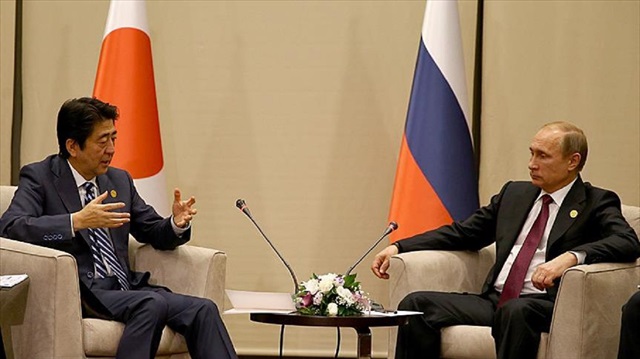

PM Abe had staked considerable amount of political capital on reaching breakthrough with Russia over decades-long dispute
Prime Minister Shinzo Abe decided to hold his summit meeting with Russian President Vladimir Putin earlier this week in the relaxing atmosphere of an onsen (hot bath) in his hometown in western Japan.
But if he was counting on the salubrious waters to loosen Putin's determination not to make any significant concessions on four disputed islands north of Hokkaido that Russia has occupied since the end of World War II, he was disappointed.
The territorial dispute, which has roiled relations between the two countries and prevented the signing of a peace treaty formally ending the war, has remained unresolved for 50 years and looks to stay unresolved for another 50 years.
Putin did offer one small concession on the territorial issue -- he suggested a joint economic development of the islands under Russian law.
That proposition, originally proposed by Moscow in the 1990s, has always been a non-starter for Japan as it implies Russian sovereignty.
It was also very doubtful that Putin would have made any major offers on the Northern Territories -- known as the Southern Kurils in Russia -- so long as Japan maintained sanctions against Russia for its annexation of the Crimea.
Abe had staked a considerable amount of his prestige and political capital on reaching a breakthrough, but it was never very likely that Abe would have ended a stalemate that has gone on for decades in just one meeting.
Prior to the “Onsen Summit” this month, Abe has met with Putin three times this year, first in May at Sochi, Russia, and on the sidelines of economic meetings in Lima, Peru and Vladivostok.
However, if one were to subtract the territorial issue, the summit meeting -- Putin's first official visit to Japan in 11 years -- might be considered a fairly normal, even routine, meeting of world leaders.
Japan and Russia exchanged some 80 agreements on economic cooperation, with special emphasis on discovery and production of oil and natural gas, and on nuclear power and in the health sector.
During the summit, three major Japanese trading companies announced they were signing agreements with Russia's Novatek, the second-largest Russian producer of natural gas, even though the company is still sanctioned by G-7 countries.
That has led some to conclude that Japan might become the first G-7 country to lift sanctions, potentially driving a wedge in the group's joint project.
A proposal to lift visa requirements for Japanese wanting to visit the disputed islands also undermines one of the sanctions.
The Putin visit comes at a time when the political and strategic outlook for North East Asia is in a considerable state of flux.
This includes the impeachment of South Korean President Park Geun-hye and the possibility of a new administration in Seoul.
Tokyo worries further that the incoming United States administration plans to put less emphasis on allies in the region, while changing its position on China. Meanwhile, the incoming president has shown it wants closer relations with Russia.
#Shinzo Abe
#Vladimir Putin
#Russia
#Japan

